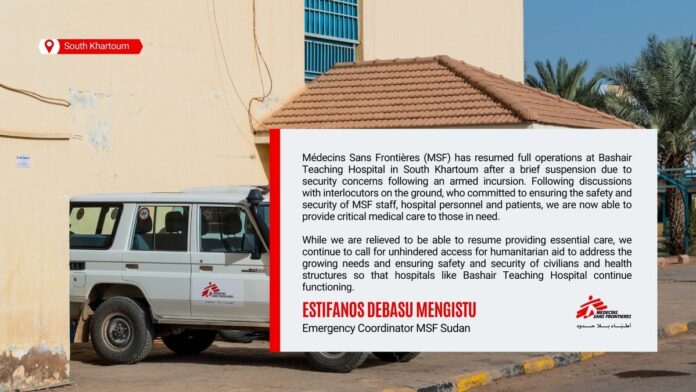MSF has resumed full operations at Bashair Teaching Hospital
(MSF) has resumed
Médecins Sans Frontières (MSF) has resumed full operations at Bashair Teaching Hospital in South Khartoum after a brief suspension due to security concerns following an armed incursion.
Following discussions with interlocutors on the ground, who committed to ensuring the safety and security of MSF staff, hospital personnel and patients, we are now able to provide critical medical care to those in need.
While we are relieved to be able to resume providing essential care, we continue to call for unhindered access for humanitarian aid to address the growing needs and ensuring safety and security of civilians and health structures so that hospitals like Bashair Teaching Hospital continue functioning.
Estifanos Debasu Mengistu, Emergency Coordinator MSF Sudan.
Sudan: 16% of war-wounded patients at south Khartoum hospital are children
Approximately one in six war-wounded patients treated at the Bashair Teaching Hospital in south Khartoum since January 2024 have been under the age of 15, medical organisation Médecins Sans Frontières (MSF) said today. Many suffered gunshot, blast and shrapnel wounds. Doctors are also concerned about the spike in children arriving at the hospital severely malnourished.
MSF teams working alongside hospital staff have treated more than 4,214 patients for trauma injuries caused by violence, including gunshots and bomb blasts. Of these, 16% were children under 15 years. This is one of the last functioning hospitals in south Khartoum. It provides emergency and surgical care as well as maternal healthcare services.
“18-month-old baby Riyad was brought to the emergency room after a stray bullet struck his right side while he was napping in his family’s home,” said Dr Moeen*, MSF medical team leader.
“The medical team fought for four hours to stabilise him. Due to the heavy loss of blood, the chances of him surviving the surgery were fifty-fifty.”
The team was able to stop the bleeding however the bullet remained lodged in his chest. It is unclear how long it will be before anything can be done about this. The hospital does not have advanced surgical capacities, partly as a result of a systematic blockage on sending surgical supplies since October 2023. Referring patients out of area is also very difficult as transport routes are either destroyed or far too dangerous.
Riyad is one of the 314 children treated for gunshot and blast wounds in 2024.
Radiographie du bébé Riyad. Le bébé de 18 mois a été touché à la poitrine par une balle perdue alors qu’il faisait une sieste à Khartoum.
Deliberate blockages on the transport of medical supplies and medicines also mean that some procedures, such as treating severe burn injuries, are not possible. This is worrying as there is no fully functioning burn centre left in the city and civilians are increasingly victims of bomb blasts.
In late October more than 30 war wounded patients were rushed to Bashair Hospital in one day following an explosion at a market less than one kilometre away. Twelve of those brought to the emergency room were children under 15. Many had suffered burns and trauma wounds. One girl of 20 months came in with shrapnel deep in her head. While the team carefully laid her on the x-ray table, part of the tiny head’s fragile skullcap fell onto the table. “Cases like this are common,” Dr Moeen* says. “Thankfully that little girl survived. Others are not so lucky”.


